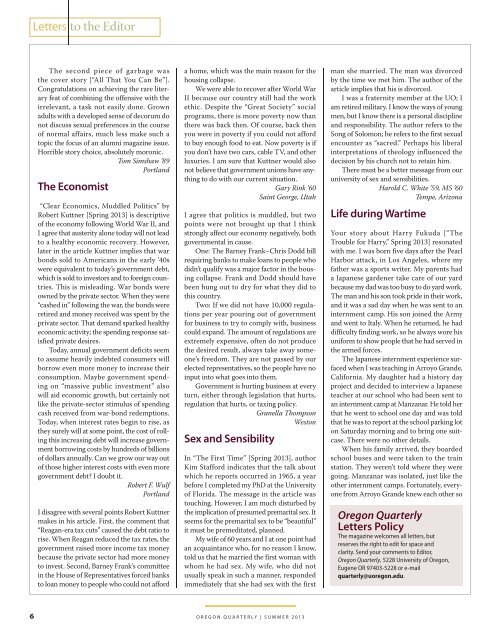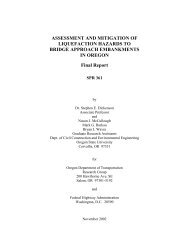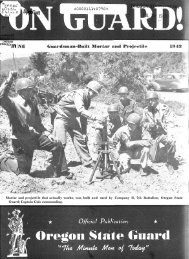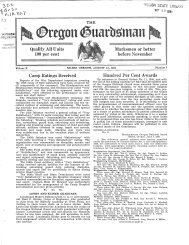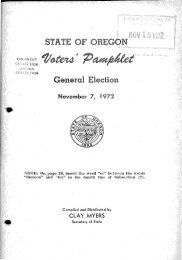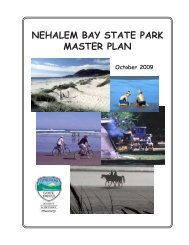Summer 2013 - Oregon State Library: State Employee Information ...
Summer 2013 - Oregon State Library: State Employee Information ...
Summer 2013 - Oregon State Library: State Employee Information ...
Create successful ePaper yourself
Turn your PDF publications into a flip-book with our unique Google optimized e-Paper software.
The second piece of garbage was<br />
the cover story [“All That You Can Be”].<br />
Congratulations on achieving the rare literary<br />
feat of combining the offensive with the<br />
irrelevant, a task not easily done. Grown<br />
adults with a developed sense of decorum do<br />
not discuss sexual preferences in the course<br />
of normal affairs, much less make such a<br />
topic the focus of an alumni magazine issue.<br />
Horrible story choice, absolutely moronic.<br />
Tom Simshaw ’89<br />
Portland<br />
The Economist<br />
“Clear Economics, Muddled Politics” by<br />
Robert Kuttner [Spring <strong>2013</strong>] is descriptive<br />
of the economy following World War II, and<br />
I agree that austerity alone today will not lead<br />
to a healthy economic recovery. However,<br />
later in the article Kuttner implies that war<br />
bonds sold to Americans in the early ’40s<br />
were equivalent to today’s government debt,<br />
which is sold to investors and to foreign countries.<br />
This is misleading. War bonds were<br />
owned by the private sector. When they were<br />
“cashed in” following the war, the bonds were<br />
retired and money received was spent by the<br />
private sector. That demand sparked healthy<br />
economic activity; the spending response satisfied<br />
private desires.<br />
Today, annual government deficits seem<br />
to assume heavily indebted consumers will<br />
borrow even more money to increase their<br />
consumption. Maybe government spending<br />
on “massive public investment” also<br />
will aid economic growth, but certainly not<br />
like the private-sector stimulus of spending<br />
cash received from war-bond redemptions.<br />
Today, when interest rates begin to rise, as<br />
they surely will at some point, the cost of rolling<br />
this increasing debt will increase government<br />
borrowing costs by hundreds of billions<br />
of dollars annually. Can we grow our way out<br />
of those higher interest costs with even more<br />
government debt? I doubt it.<br />
Robert F. Wulf<br />
Portland<br />
I disagree with several points Robert Kuttner<br />
makes in his article. First, the comment that<br />
“Reagan-era tax cuts” caused the debt ratio to<br />
rise. When Reagan reduced the tax rates, the<br />
government raised more income tax money<br />
because the private sector had more money<br />
to invest. Second, Barney Frank’s committee<br />
in the House of Representatives forced banks<br />
to loan money to people who could not afford<br />
a home, which was the main reason for the<br />
housing collapse.<br />
We were able to recover after World War<br />
II because our country still had the work<br />
ethic. Despite the “Great Society” social<br />
programs, there is more poverty now than<br />
there was back then. Of course, back then<br />
you were in poverty if you could not afford<br />
to buy enough food to eat. Now poverty is if<br />
you don’t have two cars, cable TV, and other<br />
luxuries. I am sure that Kuttner would also<br />
not believe that government unions have anything<br />
to do with our current situation.<br />
Gary Rink ’60<br />
Saint George, Utah<br />
I agree that politics is muddled, but two<br />
points were not brought up that I think<br />
strongly affect our economy negatively, both<br />
governmental in cause.<br />
One: The Barney Frank–Chris Dodd bill<br />
requiring banks to make loans to people who<br />
didn’t qualify was a major factor in the housing<br />
collapse. Frank and Dodd should have<br />
been hung out to dry for what they did to<br />
this country.<br />
Two: If we did not have 10,000 regulations<br />
per year pouring out of government<br />
for business to try to comply with, business<br />
could expand. The amount of regulations are<br />
extremely expensive, often do not produce<br />
the desired result, always take away someone’s<br />
freedom. They are not passed by our<br />
elected representatives, so the people have no<br />
input into what goes into them.<br />
Government is hurting business at every<br />
turn, either through legislation that hurts,<br />
regulation that hurts, or taxing policy.<br />
Granella Thompson<br />
Weston<br />
Sex and Sensibility<br />
In “The First Time” [Spring <strong>2013</strong>], author<br />
Kim Stafford indicates that the talk about<br />
which he reports occurred in 1965, a year<br />
before I completed my PhD at the University<br />
of Florida. The message in the article was<br />
touching. However, I am much disturbed by<br />
the implication of presumed premarital sex. It<br />
seems for the premarital sex to be “beautiful”<br />
it must be premeditated, planned.<br />
My wife of 60 years and I at one point had<br />
an acquaintance who, for no reason I know,<br />
told us that he married the first woman with<br />
whom he had sex. My wife, who did not<br />
usually speak in such a manner, responded<br />
immediately that she had sex with the first<br />
man she married. The man was divorced<br />
by the time we met him. The author of the<br />
article implies that his is divorced.<br />
I was a fraternity member at the UO; I<br />
am retired military. I know the ways of young<br />
men, but I know there is a personal discipline<br />
and responsibility. The author refers to the<br />
Song of Solomon; he refers to the first sexual<br />
encounter as “sacred.” Perhaps his liberal<br />
interpretations of theology influenced the<br />
decision by his church not to retain him.<br />
There must be a better message from our<br />
university of sex and sensibilities.<br />
Harold C. White ’59, MS ’60<br />
Tempe, Arizona<br />
Life during Wartime<br />
Your story about Harry Fukuda [“The<br />
Trouble for Harry,” Spring <strong>2013</strong>] resonated<br />
with me. I was born five days after the Pearl<br />
Harbor attack, in Los Angeles, where my<br />
father was a sports writer. My parents had<br />
a Japanese gardener take care of our yard<br />
because my dad was too busy to do yard work.<br />
The man and his son took pride in their work,<br />
and it was a sad day when he was sent to an<br />
internment camp. His son joined the Army<br />
and went to Italy. When he returned, he had<br />
difficulty finding work, so he always wore his<br />
uniform to show people that he had served in<br />
the armed forces.<br />
The Japanese internment experience surfaced<br />
when I was teaching in Arroyo Grande,<br />
California. My daughter had a history day<br />
project and decided to interview a Japanese<br />
teacher at our school who had been sent to<br />
an internment camp at Manzanar. He told her<br />
that he went to school one day and was told<br />
that he was to report at the school parking lot<br />
on Saturday morning and to bring one suitcase.<br />
There were no other details.<br />
When his family arrived, they boarded<br />
school buses and were taken to the train<br />
station. They weren’t told where they were<br />
going. Manzanar was isolated, just like the<br />
other internment camps. Fortunately, everyone<br />
from Arroyo Grande knew each other so<br />
<strong>Oregon</strong> Quarterly<br />
Letters Policy<br />
The magazine welcomes all letters, but<br />
reserves the right to edit for space and<br />
clarity. Send your comments to Editor,<br />
<strong>Oregon</strong> Quarterly, 5228 University of <strong>Oregon</strong>,<br />
Eugene OR 97403-5228 or e-mail<br />
quarterly@uoregon.edu.<br />
6 OREGON QUARTERLY | SUMMER <strong>2013</strong>


